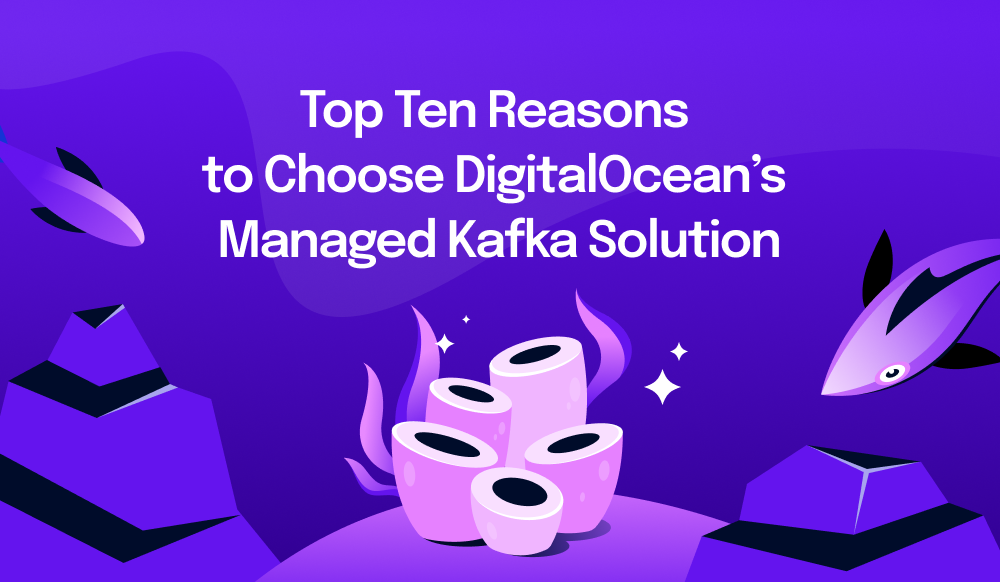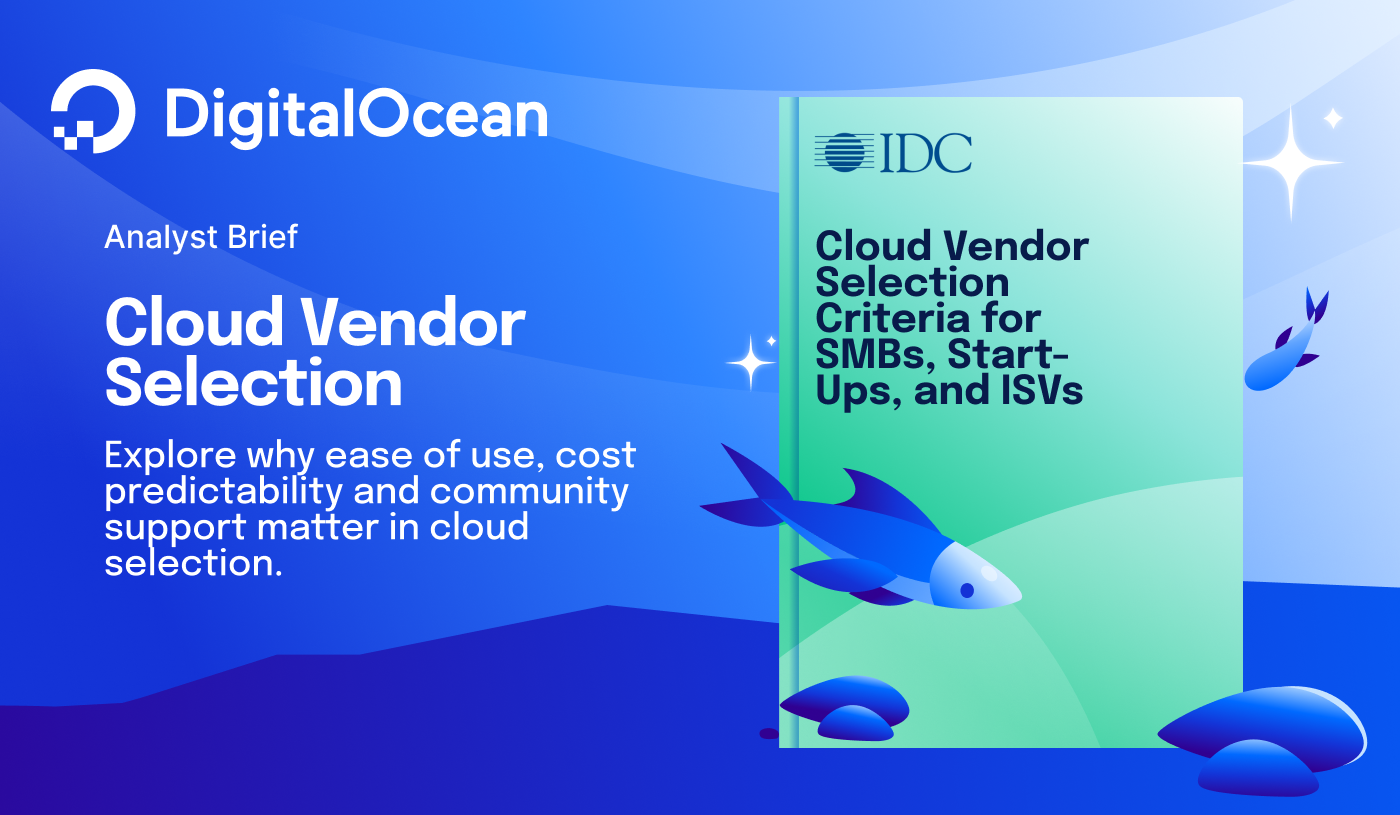Cloud solutions for Blockchain Technology | DigitalOcean
Robert Sheber
Blockchain technology is best known for its application in cryptocurrency, where it is used to create secure and decentralized currencies such as Bitcoin. However, blockchain is a powerful tool that has applications ranging far beyond financial systems, and in the past few years, the adoption of blockchain has grown to a range of use cases. Applications built on blockchain technology have unique requirements for their infrastructure, and in this post, we’ll outline some of the challenges that arise in building a blockchain-based application, and how a cloud provider like DigitalOcean can help blockchain businesses succeed.
What is blockchain?
A blockchain is essentially a database system that uses “blocks” to store data in a decentralized way. These blocks of data are stored on thousands of distributed nodes, which run on servers or other machines with computing power. Blocks are linked together in a “chain”, with new blocks being built on top of the old blocks, forming an extremely secure and traceable data system. Because a blockchain is built on a decentralized network, no individual computer has power over the entire blockchain, and previous data blocks cannot be modified. This means that blockchain provides an unmodifiable record of ownership or information that goes back to when the chain was first created.
Organizations now are using blockchain to securely store data of all types, from medical data to supply chain information related to critical goods such as food and minerals. Blockchain technology is used by many enterprise organizations already, and more startups are emerging each year that leverage blockchain technology to meet the needs of their specific sectors–in the second quarter of 2021, CB Insights reported that blockchain startups raised over $4 billion dollars in funding, the largest amount ever.
Blockchain’s cloud needs
Those looking to start a blockchain-related business have to overcome unique challenges around their technology stack and cloud infrastructure. Because blockchains are built on thousands of nodes and new nodes are constantly being added to a chain, they require a huge amount of aggregate computer power to support. Blockchains also must be able to quickly add more computing power to their network as the chain grows, so need to create systems that automatically scale up as needed.
Buying and managing on-premises servers to support a blockchain network can be time-consuming and inefficient, so blockchain businesses often leverage cloud computing companies to host their networks but require a specific type of cloud infrastructure to be successful. Cost is an important factor in choosing a cloud provider for blockchain companies, as computing power is often one of the biggest costs they experience. The ease and speed with which developers can add computing power to the network is also critical for blockchains. Because blockchains rely on being online to generate revenue and continue operations, they require a reliable cloud provider with minimal downtime. Finally, as blockchains are distributed, they require a globally distributed cloud infrastructure so that they can spread nodes across regions, data centers, and even multiple cloud providers in order to have redundancy in their setup.
Blockchain businesses building on DigitalOcean
DigitalOcean’s simple, low-cost Droplet virtual machines, combined with other services such as our managed Kubernetes offering, have proven to be an excellent match for the needs of blockchain businesses. Companies including Blockspaces, DCM, QuickNode, and Elrond leverage DigitalOcean’s cloud services to run their blockchain networks and serve thousands of users around the globe.
BlockSpaces offers an integration platform that supports connection between business applications and blockchain networks (public and private) through managed infrastructure, no/low code workflows, and robust performance analytics. Designed for companies that need to deploy blockchain solutions without dealing with the complexities involved in integrating the technology to existing systems, the company has seen a 43% CMGR in the past 12 months and a 15x increase in blockchain workloads since raising a seed round of capital in early 2021. They leverage DigitalOcean Droplets, our low-cost virtual machines, and our simple-to-use API and CLI to support their growth.
“DigitalOcean has a great workflow that enables us to deploy blockchain nodes quicker and easier, which are key factors that have allowed us to grow as large and as fast as we have to serve more customers.”
Digital Capital Management is an investment fund manager in the crypto space. They enable individuals to invest in the crypto and blockchain space through strategic investments, including cryptocurrency tokens used in the Presearch project, a decentralized search network that relies on the Ethereum blockchain. Rather than generating positive performance solely through trading, DCM also “stakes” Presearch tokens (known as “PRE”) on a large number of nodes which allow searches made through the project to be decentralized. As income from each node is generated only when it is on-line, DCM elected to use a cloud solution with relatively low costs and high reliability.
“We run a large number of Droplets. If one goes offline, DigitalOcean automatically moves our systems to a new Droplet with almost no downtime. With DigitalOcean, we’re able to quickly spin up new Droplets with just a few clicks, and the relatively low cost enables us to keep our own operating costs down, improving profits.”
QuickNode enables developers to integrate with multiple large blockchain networks, including Bitcoin, Ethereum, and Solana, through elastic APIs and dedicated nodes. They provide customers with in-depth analytics and tools that enable businesses to easily create and scale blockchain applications without needing to worry about the blockchain infrastructure. QuickNode recently raised a $35 million Series A funding round and has been a DigitalOcean user since its inception.
“We started with DigitalOcean and we grew with DigitalOcean. We were pretty ecstatic when we were doing three and a half billion requests a month, which translates to 3,500 requests a second, and now we’re doing 10X that, so DigitalOcean has helped us scale throughout our journey.”
The Elrond blockchain is the second-largest Proof of Stake network in the world after Ethereum 2.0, with 3,200 validator nodes supporting its geographically dispersed main network. When counting the main and backup nodes, as well as several public test networks and auxiliary systems, the Elrond infrastructure spans close to 10,000 servers.
“Elrond is the first Proof of Stake network to implement all three types of sharding: state, network, and transactions. Maintaining this architecture in a high throughput environment of up to 15,000 transactions per second requires dependable network connectivity and dynamic provisioning capabilities, which Digital Ocean reliably provides to support us on our mission” said Lucian Mincu, Elrond Network CIO.
Build your blockchain business on DigitalOcean
If you are starting or already running a blockchain business and are in need of a low-cost, reliable, and developer-friendly cloud solution, try DigitalOcean today. Our range of products and industry-leading pricing can enable the growth of your blockchain business, and you can get started today in just a few clicks. Contact our sales team today to learn more.
Related Articles

Top 10 Reasons to Choose DigitalOcean’s Managed Kafka Solution
Faye Hutsell
April 23, 2024•4 min read

Accelerate Your Business with DigitalOcean App Platform
Bikram Gupta and mfranco
April 1, 2024•5 min read
